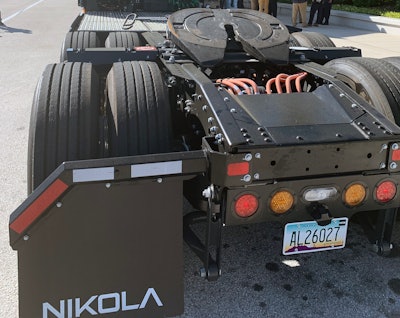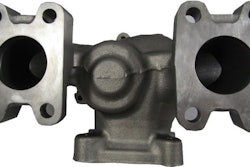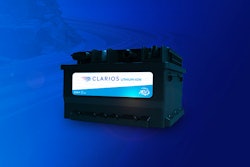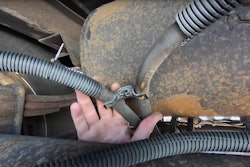
Electric trucks carry a load, in more ways than one. There is the work they are designed to carry out, hauling and delivering freight or serving as a platform for vocational equipment, and then their critical role as slashers of greenhouse gas emissions.
The slowly but steadily building wave of battery-electric vehicles washing over trucking has original equipment manufacturers seeking to cut weight, due to how heavy BEV and HEV batteries are, and correct for differences in certain operating characteristics between electric powertrains and ICE engines.
This OEM quest in turn is driving the development of truck tires engineered specifically to help deliver the expected on-the-road performance of electric trucks while ensuring low rolling resistance and longevity. And all that while making sure EV tires remain entirely suitable for use on diesel or gasoline, to avoid fleets having to spec multiple tire types for the same applications.
For starters, though, rest assured that electric trucks don’t need special tires to run legally on the road. Rather, tires engineered for EV placement may assist truck builders to improve EV performance by ensuring the longevity of these tires despite carrying heavier vehicle loads and, arguably more critical, enabling these tires to better counter the higher torque of electric motors and their effect on traction.
Weighing weight
The weight issue is real, as reflected by the “adjustment of federal rules a few years ago to allow EV Class 8 trucks an extra 2,000-lb. allowance, to operate up to 82,000 lbs. GCW,” Rick Mihelic, Director of Emerging Technologies for the North American Council for Freight Efficiency (NACFE), told CCJ.
“Truck tare weights vary considerably,” he continued. “Some daycab EV tractors are within 2,000 lbs. of sleeper-equipped diesel trucks. But some may be 5,000 lbs. and some as much as 10,000 lbs. more than a sleeper diesel. And daycab diesels are 3,000 to 5,000 lbs. lighter than sleeper diesels. So, yes, tare weights of electric-powered day cabs are heavier and that will wear tires more quickly.”
However, according to Mihelic, the extra weight of an EV battery pack is “no different in impact than trucks would see from cargo weight differences-- truck tires are designed to operate up to 80,000 lbs. normally, and EVs only expand that to 82,000 lb. The tire doesn't know the weight is batteries or cargo.” He added that “Class 3 to 6 trucks that don't typically see maximum-weight cargoes would naturally wear [tires] faster. as if they were carrying more cargo daily.
Rolling ahead
Most major truck tire manufacturers told CCJ that they have tires under development for electric trucks. Among them, Goodyear already has two EV-specific truck tires on the market while both Michelin and Bridgestone have rolled out tires for electric truck buses. Bridgestone also offers certain truck tires that it regards as “EV-ready” products.
“As EV tire requirements are still being developed [by truck makers] and continue to change and adapt, Continental is still in the information gathering stage of developing EV-specific tires,” Shaun Uys, vice president of Marketing & Sales for Continental Truck Tires USA, told CCJ.
He said “the main reason for developing tires specifically for medium- to heavy-duty electric trucks is the impact these vehicles have on tires. EVs wear tires down at a faster rate than non-electric vehicles. Electric vehicles also cannot travel as far as a diesel truck before they need to be recharged. Therefore, they need to have the right amount of rolling resistance, since rolling resistance helps with increasing the vehicle range.”
“Both BEVs and HEVs have the added weight that must be addressed,” Tom Clauer, Yokohama Tire’s senior manager of commercial product planning, told CCJ. “Electric trucks with smaller batteries, common in drayage, urban P&D, and some regional operations, are able to use current tire sizes and load ranges.
“Getting into larger battery configurations presents considerable weight increases – some indicate up to 5,000 lbs. +/- vs. ICE units,” he continued. “Long-haul applications use these larger batteries and/or hydrogen/battery power sources, which both increase the weight dramatically vs. ICE.”
Torque impacts
Clauer also pointed to changes in torque impacts resulting from electric power. “We hear a lot about the extra torque applied on drive-axle positions. The difference will be with on-highway torque, such as pulling hills where the torque applied by the EV/HEV is constant, whereas with ICE units it is normally declining. Another related feature to consider with EVs/HEVs is the regenerative aspect or the ‘braking torque’ these vehicles have.”
Continental’s Uys said the additional regenerative braking of EVs requires the tire “to have a balance of wear resistance and rolling resistance for the range of the vehicle. When vehicles have an increase in torque, the tires must have proper traction. Additionally, most diesel vehicles decrease in weight as they are traveling and depleting the fuel in their tanks. That lessens the load on the tires.
“But with EV trucks,” he added, “the load is not just additional, it is constant, and it rarely depletes in weight. The tire construction for these vehicles needs to be adapted to fit the consistent weight.”
Robby Hamby, director of Commercial Product Strategy for Bridgestone Americas, told CCJ that when it comes to EVs, tire engineers are “focusing on developing innovative, environmentally friendly technologies and processes that can extend the life of the product and advance the performance of EVs.
“For example,” he continued, “tread features of electric truck tires, such as multiple gripping edges and wide grooves, can help promote wet traction. Casing enhancements to both the belt package and bead area can contribute to reduced strain, providing for improved overall durability.”
What goes round
Hamby also stressed the importance of retreading. “Retreading plays a critical role in lowering the total cost of EV tires, but more importantly, in advancing sustainability in the commercial industry. The demands placed on tires by EVs are unique, and those tires require attention to tread wear, proper inflation, and maintenance to ensure maximum retreadability. Retreading, such as with Bridgestone’s Bandag retreads, can extend the life of a casing for an EV in the same manner as for a non-EV. Bridgestone is working on accelerating the adoption of EVs by manufacturing tires to be highly retreadable.”
Hamby contended that retreading is key to calculating a fleet return on investment for EV tires. “Speaking broadly, no two fleets are the same and every fleet is comprised of different vehicle counts and types,” he said. “With that in mind, Bridgestone is prioritizing retreading when it comes to manufacturing all tires to contribute to a circular economy and improve the bottom line for customers.”
“The need for energy efficiency in the form of low rolling resistance and greater load carrying capacity to handle the extra vehicle weight are the key reasons for developing specially designed tires for medium- to heavy-duty electric trucks,” Tom Lippello, senior director, Commercial Marketing, Goodyear North America, told CCJ.
“Goodyear took those factors into consideration to develop and launch several tires that bear the ‘Electric Drive Ready’ badge,” he said. These tires “can feature enhanced casing durability for higher load carrying capacities and retreadability due to battery weight.” He added that EV “drive-axle torques can cause faster or various wear conditions, but these can be mitigated through tread design, footprint optimization, or compound selection.”
Striking a balance
Lippello also said that regardless of vehicle weight class, enhanced tread patterns and optimized footprints can help deliver even wear in high-torque applications. “There is a balance between tread design, compound selection, and traction features to deliver products that will perform on different types of vehicles in a variety of applications.”
Turning to Goodyear’s portfolio of EV-specific truck tires, the company introduced its first commercial truck tire for EVs, the Endurance RSA 17.5” ULT, in 2022. Earlier this year, the RangeMax RSDEV was launched as Goodyear’s first regional drive tire for EVs. It’s designed with “ultra-low rolling resistance technology for energy efficiency and built for the higher load capacities of EVs.
“For the Endurance RSA 17.5” ULT,” Lippello continued, “we designed a tire with an enhanced load-carrying capacity to meet the needs of heavier pickup and delivery electric vehicles. In addition, an aggressive tread design and unique compounding help deliver a three-peak mountain snowflake (3PMSF) designation and durability to deliver long miles to removal. “
Looking ahead, Lippello advised that “Goodyear has plans to launch two new tires for the pickup-and-delivery and last-mile delivery segments using both the RangeMax naming and ‘Electric Drive Ready’ badges for the growing segment of battery-electric trucks in this space.”
Even so, it’s only a matter of time until other tire makers offer their own road-ready tires for electric trucks. As noted before, with at least two other manufacturers already supplying heavy-duty EV tires for transit buses, it’s not far-fetched to think other brands may roll out their own EV tires for trucks next year.
“In my experience working with truck tire makers,” noted NACFE’s Mihelic, “tire development for any new factor can take five years or more. We’re fairly new with EVs [as an industry] and newer, better tires will evolve for electric trucks over time-- and as fleets provide real-world feedback.”












